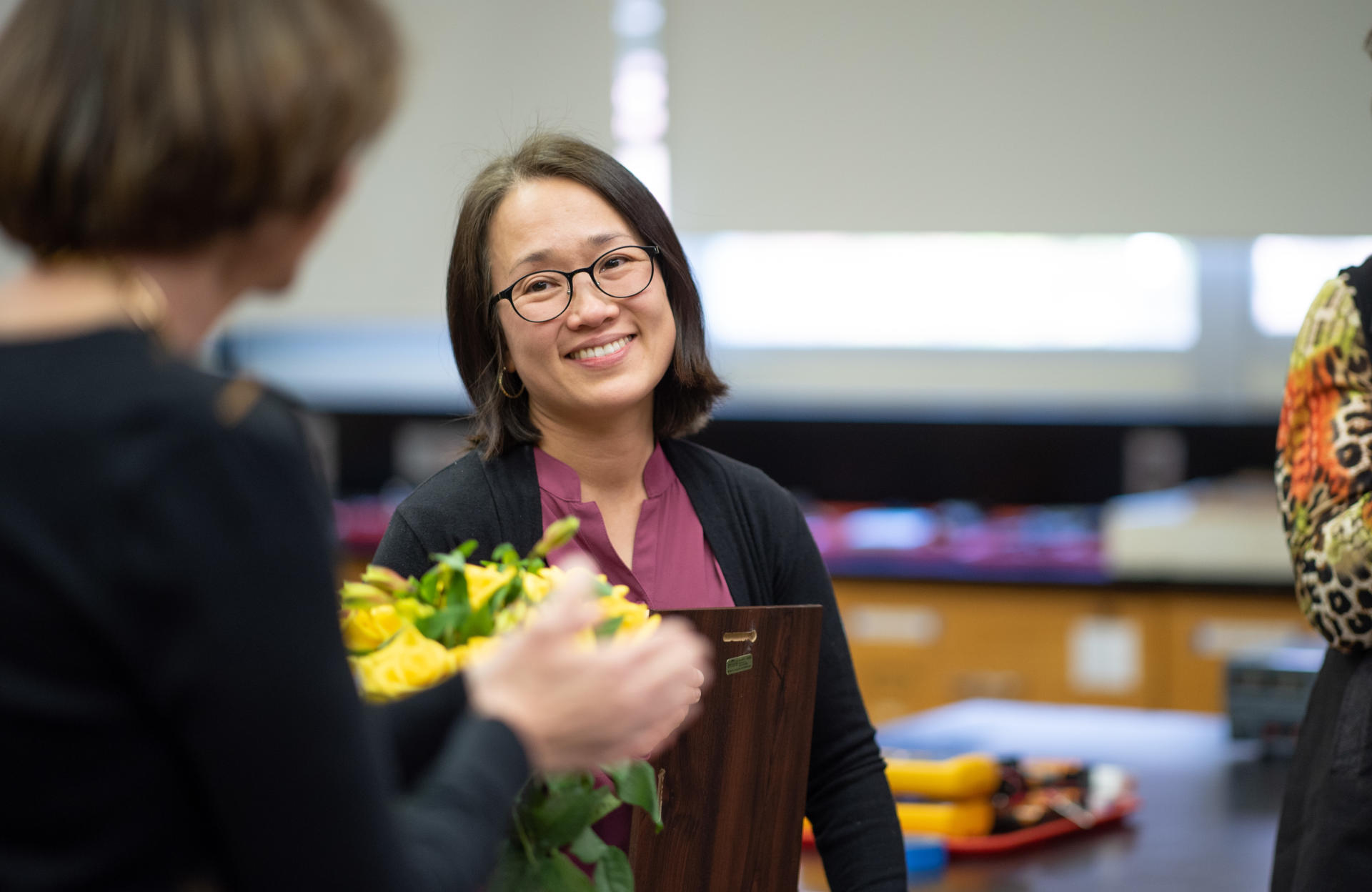Five-Year, $430,000 Grant Funds Cutting-Edge Physics Research at CSU, Chico

Professor Hyewon Pechkis is surrounded by colleagues and friends and campus leadership after being recognized for Outstanding Lecturer Award by the Faculty Recognition and Support Committee (FRAS) on Monday, March 9th, 2020 in Chico, Calif. (Jessica Bartlett/Photographer)
When atoms are cooled to near absolute zero, they slow to the point that they’re nearly motionless, changing the way they behave. Hyewon Pechkis, assistant professor in California State University, Chico’s Department of Physics, wants to study what this behavior means and how it could transform modern-day science—and she recently received a very prestigious grant to do just that.
This spring, Pechkis was awarded a National Science Foundation (NSF) Early Career Award, granting her and her cutting-edge research $428,734 over the next five years. As principal investigator for the grant proposal titled “Making a Difference in First-Generation and Underrepresented Students’ Education Through Research: Quantum Coherence in a Bose Thermal Gas,” Pechkis said her research will explore how gases and atoms behave when lasers slow them to a near-motionless state—a point near absolute zero temperature.
As atoms are cooled to these “ultracold” temperatures, Pechkis said they begin to behave like waves, according to quantum physics.
“Once cold, these gases have unique properties that make them excellent candidates for building quantum computers which, if developed, would be able to perform computations much more quickly than today’s classical computers,” she said. “My experiments will probe the boundary between the classical and quantum regimes to identify the limiting conditions for quantum effects to exist—ultimately this may enable low-cost quantum devices to be developed.”
Students involved in this research will engage in unique hands-on activities, from designing and implementing experiments to gathering and measuring data to probing and fixing problems when they arise. Pechkis hopes this work can also serve as a blueprint for similar underrepresented minority- and first generation-serving undergraduate institutions to integrate research and education—a topic close to her heart.
“I once was a first-generation student who didn’t know how to forge a path ahead. As a minority and woman in STEM, guiding and supporting first-generation students and underrepresented groups means more to me than just teaching,” she said. “In some sense, I am paying back what I got from my teachers and friends along the way to get here.”
David Hassenzahl, dean of the College of Natural Sciences, said in granting the award, the NSF demonstrates its confidence that Pechkis will make profound contributions to her field of study—while also reaffirming her commitment to provide unrivaled opportunities to first-generation and underrepresented students, a centerpiece of CSU, Chico’s academic mission.
“I really can’t understate how impressive it is that Dr. Pechkis has received this grant,” Hassenzahl said. “We are very fortunate that the University has such a world-class physicist, and one who brings joy, passion and energy to her interactions with our students.”
Teaching at CSU, Chico since fall 2016, Pechkis was also honored as Outstanding Early Career Faculty this spring. Immediately after joining the Department of Physics in 2016, Pechkis created a state-of-the-art research lab using equipment donated by the National Institute of Standards and Technology (NIST) and supported by Nobel Laureate William Phillips and Dr. Ian Spielman. The cutting-edge technology in the ultra-cold atom laboratory—which includes a magneto-optical trap, lasers, and vacuum technology—will provide the groundwork for her upcoming research.
She is grateful for this highly competitive funding opportunity, acknowledging that it is not easily received outside of a major research institution.
“I think that this is a good example for our students,” she said. “Take chances and set your goals high, you can achieve beyond expectations.”


